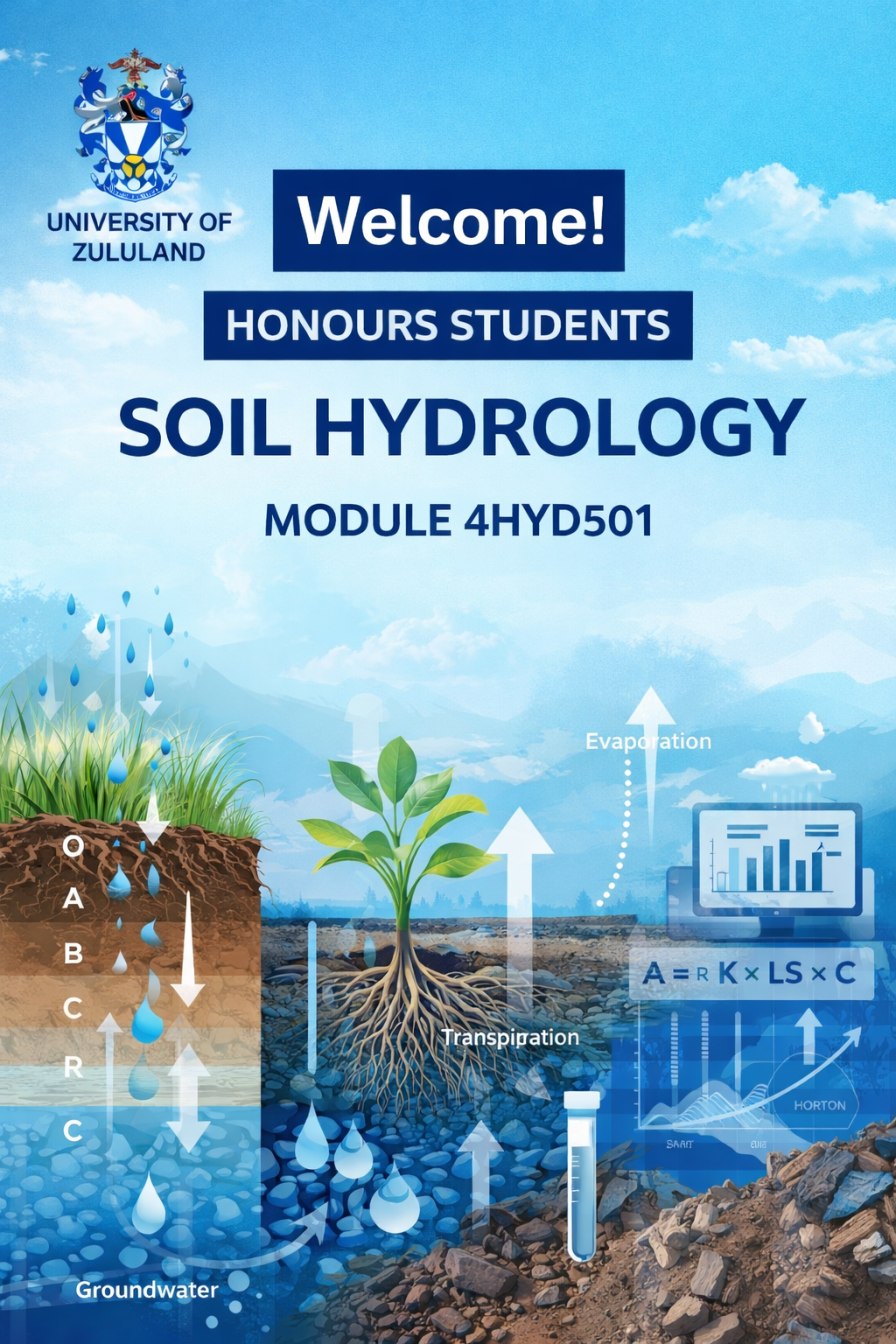4HYD311: Surface Water Hydrology
Welcome to the BSc undergraduate course in Surface Water Hydrology. The module is designed to create an understanding of the dynamics of river flow, and of probability theory as well as frequency analysis with reference to their application in surface water hydrology and hydrological modelling applications. The module is generally divided into two sections: (i) Stochastics, and (ii) Hydraulics. The course relies extensively on self-study and a resources package is supplied that gathers together relevant documents and course material that should be read and referred to in order for students to appreciate the issues involved in the dynamics of river flow, frequency analysis and the application of probability theory in hydrological modeling in South Africa, southern Africa and globally.
Post graduate Communication Hydrology
We propose to communicate clearly and frequently with PhD graduate students for two reasons:
- Students who understand the requirements and expectations of their degree programs are more likely to succeed. Successful students become happy alumni. Happy alumni are more likely to recommend potential students to the department and to contribute in other ways.
- Post graduate students are my colleagues who can offer good ideas. We are all (Faculty, staff, and students) together responsible for the operation this PhD group.
The greatest problem in communication is the illusion it has been achieved.
—George Bernard Shaw
4HYD342: Water Resources Management
Dear Students
Welcome to the Water Resources Management (S/4HYD342) Moodle page!
This is where you’ll find all the lecture slides, extra reading materials, and online quizzes. While we’ll have scheduled tests and assignments, please note that occasional online quizzes will also be posted here—so keep an eye out.
This module carries 160 credits, which means you’re expected to spend roughly 160 hours on it over the semester. That includes lectures, assignments, revision, and exam prep. If you’re doing four modules, aim to dedicate about 15 hours a week to each one. That time should cover reading through the material, working on assignments, making your own notes, exploring extra resources online, and doing the quizzes.
I’m here to support you—so don’t hesitate to reach out with questions, whether individually or as a group. When you do, please include your name, student number, and the module code (S/4HYD342) so I can respond more efficiently.
Looking forward to working with you this semester and wishing you all the best!
Best regards
Andrew Hall
halla@unizulu.ac.za
SHYD506 Disaster Management 2017
Write a concise and interesting paragraph here that explains what this course is about
4HYD509 Hydrological Research Project
Write a concise and interesting paragraph here that explains what this course is about
4HYD211: Introductory Surface water hydrology
This Moodle page covers both 4HYD211 and SHYD211
4HYD222: Introduction to Geographic Information Systems
This course introduces students to the core principles and practical applications of Geographic Information Systems (GIS) using ArcGIS Pro, the leading desktop GIS platform. Students will gain hands-on experience in managing spatial data, creating advanced 2D, 3D, and 4D visualisations, and performing spatial analyses relevant to environmental and water-related fields. Emphasis is placed on GIS as a decision-support tool in hydrology and geography, with a focus on real-world problem-solving and data sharing across the ArcGIS ecosystem. The course combines theoretical concepts with practical exercises to build proficiency in using GIS for hydrological and spatial analysis.
Lecturer: Andrew Hall
email: halla@unizulu.ac.za
4HYD 332: Hydrological Modeling
Dear Students
Welcome to Hydrological Modelling (4HYD342) on Moodle!
This will be your main hub for lecture slides, supplementary reading, updates, and online activities. In addition to scheduled assignments and tests, we’ll also have occasional online quizzes—so be sure to check Moodle regularly.
This is a 160-credit module, which means you’re expected to spend around 160 hours over the semester engaging with the content. That includes lecture time, completing assignments, revising, and preparing for the exam. If you’re enrolled in four modules this semester, aim to spend about 15 hours a week on each. This time should be used for working through materials, revisiting concepts, making your own notes, and deepening your understanding through additional reading or practice.
In this module, we’ll focus on developing your ability to simulate, interpret, and apply hydrological models to real-world water systems—building both your theoretical understanding and technical skills.
Feel free to reach out if you need help—individually or in a group. Just remember to include your name, student number, and the module code (4HYD342) when you email me so I can respond quickly and effectively.
Looking forward to a productive and engaging semester with you all.
Best regards
Andrew Hall
halla@unizulu.ac.za
Hydrological Fieldwork
Building capacity in the equipment used for hydrological fieldwork.
Hydrological Modelling: 4HYD503
 This course on groundwater modeling is specifically designed for participants in the fields of hydrology. Only a basic knowledge of groundwater terms is required for participation. Hands-on modeling experience with PCs will serve to introduce the necessary concepts and theory.
This course on groundwater modeling is specifically designed for participants in the fields of hydrology. Only a basic knowledge of groundwater terms is required for participation. Hands-on modeling experience with PCs will serve to introduce the necessary concepts and theory.
After intensive modeling instructions participants will have a basic knowledge of groundwater models, enabling them to begin to evaluate situations by using models, to discuss modeling needs with other professionals, to begin to evaluate modeling efforts of others, and to understand the importance of both the data necessary for the production of a viable assessment and the correct choice of a model for specific situations.
